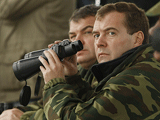Pan-European Security: Considering Russia
By Simon Saradzhyan for ISN
Russian President Dmitry Medvedev is to deliver a speech at “The Modern State and Global Security” conference in the central Russian city of Yaroslavl on 14 September. One of the topics on the agenda is “Interstate Cooperation and Efficiency of Global Institutions,” and it is likely that its participants will discuss Medvedev’s idea for a new pan-European security treaty.
Medvedev first unveiled this idea in a speech in Berlin in June 2008. He and Foreign Minister Sergei Lavrov have since fleshed it out into a rather detailed proposal on a number of occasions in Russia, Europe and the US.
The Russian leadership’s central argument for the new pan-European security architecture is that Russia does not have any institutionalized meaningful say in European security decision-making in spite of the fact that the Cold War ended long ago.
NATO won’t give Russia the right of veto, while other European organizations cannot give Moscow such a role. According to Russia, it is in the US and EU’s interest to grant Russia this right.
As importantly, the Kremlin argues that the current post-Cold War security architecture is not working. Apart from proving unable to prevent the August 2008 war in South Ossetia, the post-Cold War European security architecture’s failures as seen by the Russian leadership also include: NATO's eastward expansion; the bombing of then-Yugoslavia by NATO in 1999; US plans to deploy ballistic missile defense elements in Eastern Europe; the demise of the adapted Conventional Forces in Europe treaty; and the declaration and recognition of Kosovo's independence in 2008.
Clearly, neither the US nor the EU is satisfied with how the process of legitimization of international intervention, peacebuilding and nationbuilding in the former Yugoslavia has developed. Russia’s power of veto at the UN Security Council continues to prevent transfer of jurisdiction from UN to EU to date in what dismays both EU and US.
Obviously, both would welcome a new mechanism for conflict prevention, interdiction and resolution, including management of consequences, which would be immune to deadlocks similar to those seen in UNSC, and which could be employed in a timely manner.
The US would also be interested in European governments playing a more active role in dealing with continental challenges. The US and the EU, for instance, would have welcomed an effective European security mechanism that would have prevented Georgia attempting to re-take South Ossetia by force, and Russia responding disproportionately and recognizing the independence of Georgia’s breakaway republics of South Ossetia and Abkhazia.
Yet, in spite of this shared interest in a functioning mechanism of use of force prevention on the continent, only some European countries - such as Germany, France and Italy - have welcomed the proposal.
A number of East European countries (including Georgia) have been hostile or wary of the Russian security proposal. And the US has been generally cool to the idea.
US Ambassador to Russia John Beyrle said in October 2008 that the existing European security institutions function well and there is no need to build "something fresh here." And then-assistant secretary of state Matthew Bryza said on sidelines of an OSCE meeting of foreign ministers in December 2008 that there was an “excellent discussion" of the proposal, but it remains too “vague” to plan a summit for 2009.
The Obama administration has been more forthcoming, but again no concrete steps have been taken to discuss it in earnest.
Celeste A Wallander, the new US deputy assistant secretary of defense for Russia, Ukraine and Eurasia Policy, said in July 2009 that the “US remains open to discussion on improving the broader European security architecture, an issue raised by President Medvedev.”
Some retired US diplomats have taken a more constructive stance.
Former US deputy secretary of state Strobe Talbott argued in his February 2009 op-ed in the Financial Times that Medvedev’s idea represented an opportunity, noting that its vagueness created a vacuum, allowing the US and Europe to contribute some of their own ideas.
Notably, Medvedev’s mentor, Prime Minister Vladimir Putin (who continues to play a central role in shaping Russia’ policies on key issues) has taken a back seat on what has become Medvedev’s first major foreign policy initiative. Engaging Medvedev on his proposal would also mean strengthening his role in shaping Russia’s foreign and security policies.
In the absence of substantive feedback, Russian leaders have been fleshing out the proposal, filling out what Talbot described as a vacuum with details that may make it difficult to win EU and US acceptance. For instance, in his speech at an OSCE conference on security in June 2009, Lavrov proposed details, which if ridden of diplomatic language, would force the US to shut down bases in Europe and stay out of conflicts in Russia’s back yard.
Russia’s idea of a new pan-European security treaty has been fleshed out since then enough to suffice a meaningful discussion on what exactly the new architecture should look like or whether the existing one can still be adapted to accommodate Russia’s legitimate wish to play a role in European security.
US and EU leaders should launch a similarly meaningful dialogue before the existing system produces more, or worse, failures.

